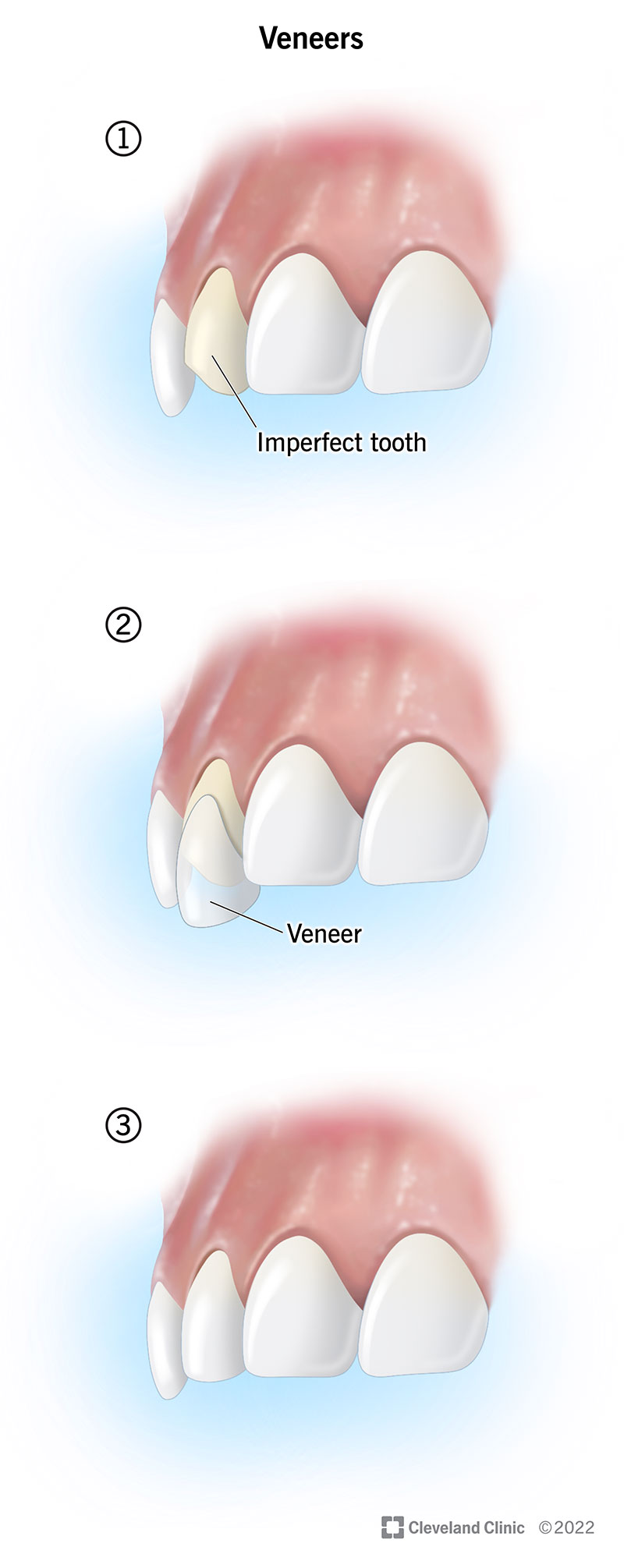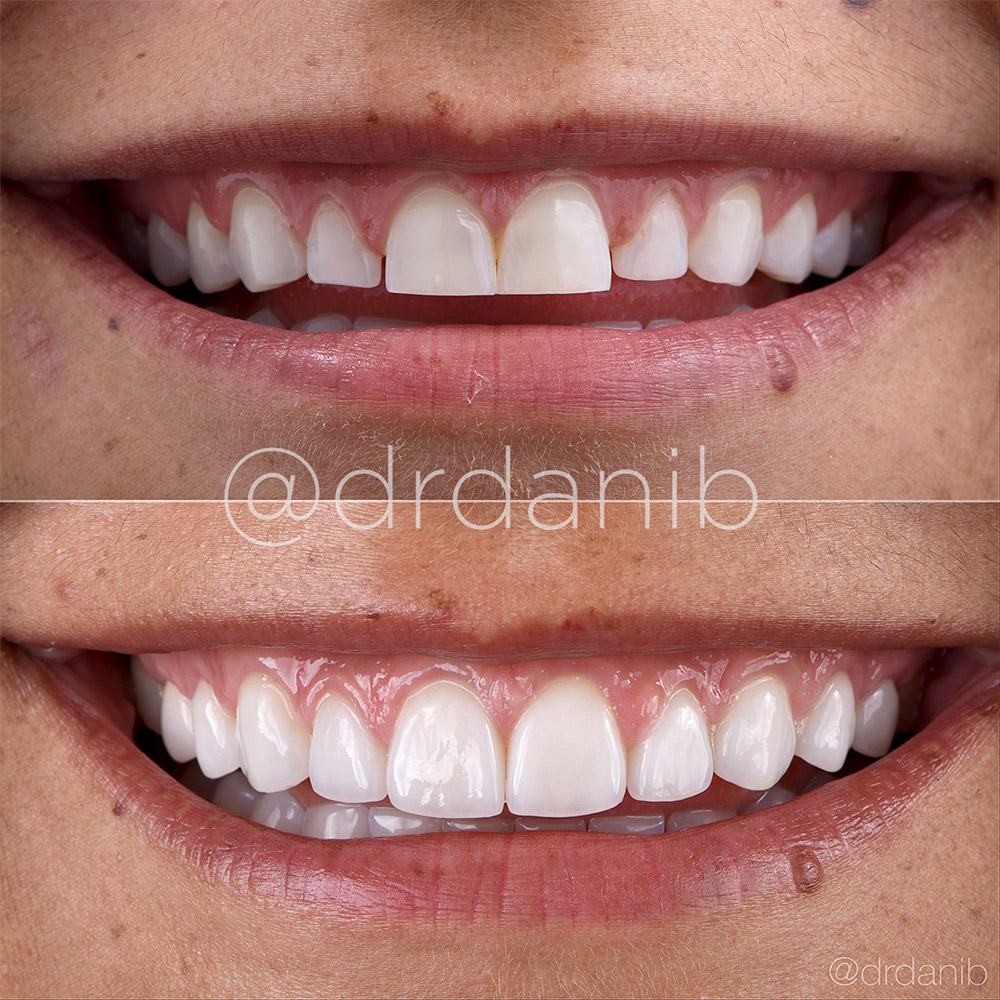Veneers Teeth Explained: Procedures, Care, and Longevity Tips
Opening the Tricks of Veneers: Facts, Types, and Advantages for a Gorgeous Smile
Veneers provide a compelling solution for those looking for to improve their smiles. These dental improvements can attend to numerous flaws, from staining to misalignment. With options like porcelain and composite, individuals can choose based upon their choices and demands. Recognizing the subtleties of veneers, consisting of application and treatment, is vital. What variables should one consider before deciding? The answers might surprise those thinking about this visual dental choice.

Comprehending Veneers: What Are They?
Veneers are thin, personalized coverings made to cover the front surface of teeth, enhancing their look. Commonly crafted from resilient materials, these coverings are customized to fit each individual's teeth specifically. They serve numerous objectives, including remedying visual flaws such as discoloration, chips, or voids. The application process entails a dental practitioner preparing the teeth, often by getting rid of a small amount of enamel to guarantee a snug fit. As soon as prepared, the veneers are bound to the teeth using a solid adhesive.
Individuals usually choose veneers for their capability to develop a natural-looking smile while offering a resilient solution to dental imperfections. Unlike other cosmetic dental care choices, veneers call for very little intrusive treatments, making them a popular option. The result is an enhanced smile that can significantly boost a person's self-confidence and self-confidence. On the whole, veneers offer a reliable approach to attaining an extra unified and eye-catching oral look.
Sorts of Veneers: Porcelain vs. Compound
When taking into consideration cosmetic oral choices, 2 primary sorts of veneers attract attention: porcelain and composite. Porcelain veneers are crafted from a sturdy ceramic material that simulates the natural look of teeth. They are understood for their discolor resistance and capability to mirror light likewise to natural enamel, providing an aesthetic charm that numerous people wish. The application procedure commonly entails more prep work of the tooth framework and may call for numerous visits to the dental professional.
On the various other hand, composite veneers are made from a tooth-colored resin that is directly put on the teeth. This type enables quicker application and can frequently be finished in a solitary check out. While they are more economical than porcelain veneers, they may not offer the very same durability or resistance to discoloration. Eventually, the option between porcelain and composite veneers relies on private preferences, spending plan, and particular dental requirements.
The Advantages of Picking Veneers
Picking veneers offers many benefits that can substantially boost both the aesthetic appeals and functionality of a person's smile. One of the main benefits is their capacity to remedy flaws such as staining, gaps, and imbalance, causing a more uniform look. Veneers can additionally improve the sturdiness of teeth, offering a safety layer that shields them from damages.
They require very little tooth preparation compared to various other dental procedures, preserving more of the all-natural tooth structure. This preservation adds to a much healthier oral atmosphere while still achieving a sensational smile.
Veneers are extremely customizable, allowing individuals to select the form, size, and color that best matches their preferences. Additionally, they are stain-resistant, making it much easier to preserve a eye-catching and brilliant smile gradually. Generally, veneers present an effective choice for those looking for both cosmetic improvement and long-lasting oral health and wellness advantages.
The Veneer Application Refine
The veneer application procedure includes several key steps to guarantee suitable results. Originally, a consultation is performed to examine the client's requirements, complied with by the prep work and shaping of the teeth. Ultimately, the veneers are bonded in position, with adjustments produced a perfect fit and look.
Preliminary Assessment Tips
A comprehensive first appointment is essential for any individual taking into consideration veneers, as it establishes the structure for a successful treatment. During this meeting, the dental professional assesses the person's dental wellness, discussing any existing concerns that could affect the veneer application. This analysis might include X-rays and an aesthetic examination to determine the problem of the periodontals and teeth.
The dental practitioner additionally engages the individual in a detailed discussion about their aesthetic goals, choices, and expectations. They may provide numerous veneer options tailored to the client's specific needs. Additionally, the expert discusses the procedure, potential risks, and aftercare requirements, guaranteeing that the person is comfy and educated before continuing with the treatment.
Prep Work and Shaping Teeth
After the initial appointment, the following stage includes the preparation and shaping of the teeth to accommodate the veneers. This crucial step is carried out by the dental professional, that very carefully assesses the tooth structure to figure out the quantity of enamel that needs to be eliminated. Generally, a thin layer, generally around 0.5 millimeters, is slashed off to assure an appropriate suitable for the veneers. Precision is critical throughout this process, as it affects both the overall convenience and the visual result. Once the teeth are effectively formed, impacts are taken to develop custom veneers that straighten perfectly with the patient's dental profile. This thorough prep work establishes the phase for an effective veneer application, improving both look and feature.
Bonding and Last Modifications
Following the shaping and prep work of the teeth, the bonding procedure starts, marking a vital stage in the veneer application. Throughout this stage, an oral adhesive is put on the prepared tooth surface, assuring a solid bond between the tooth and the veneer. The dental professional thoroughly places the veneer, making changes to accomplish the desired positioning and visual appeals. As soon as correctly positioned, an unique light is utilized to treat the glue, solidifying the bond. After treating, the dentist performs final changes, trimming any excess product and improving the veneer's shape to ensure a natural look. This cautious interest to detail boosts both feature and appearances, adding to an overall lovely smile that is resilient and durable.
Taking care of Your Veneers: Upkeep Tips
Taking care of veneers is important to maintain their look and longevity. A constant day-to-day cleansing regimen, mindful evasion of discoloring foods, and regular oral check-ups are crucial components of effective maintenance. These practices aid assure that veneers continue to be in peak problem and continue to improve one's smile.
Daily Cleansing Routine
Consistently preserving veneers is vital for their durability and appearance. An appropriate day-to-day cleaning routine can aid maintain their shine and stop damages. Dentists suggest brushing twice a day with a soft-bristled toothbrush and fluoride toothpaste, making sure that all surface areas are cleaned up gently to prevent scratching the veneer surface area. Flossing day-to-day is also vital Related Site to remove food bits and plaque from between teeth, where brushes may not reach. Additionally, making use of an antimicrobial mouthwash can help maintain dental hygiene without hurting the veneers. It is a good idea to prevent abrasive cleaners and devices that can damage the veneer. By complying with these basic steps, individuals can keep their veneers looking stunning while promoting overall oral wellness.
Preventing Staining Foods
Veneers are created to boost the appearance of teeth, their sensitivity to tarnishing necessitates cautious nutritional choices. It is important for people with veneers to be mindful of specific foods and beverages that can lead to discoloration. Dark-colored things such as coffee, red wine, and berry juices ought to be eaten in moderation, as they are known to stain both all-natural teeth and veneers. Furthermore, acidic foods like citrus fruits container compromise the bonding representatives utilized in veneers, making them more susceptible to discoloration. To keep a bright smile, it is a good idea to rinse the mouth with water after eating discoloration foods and to practice routine dental health. These thoughtful options contribute substantially to the long life and aesthetics of veneers.

Regular Dental Examinations

Preserving the integrity of veneers needs a commitment to regular dental examinations, as these visits play an essential duty in ensuring their durability and appearance. During these sees, dental experts can assess the problem of the veneers, checking for any type of signs of wear, damage, or underlying oral problems. Furthermore, routine cleanings assist remove plaque and tartar that can collect around the veneers, promoting total dental wellness. Dental practitioners can additionally offer individualized advice on care strategies and products suited for veneer maintenance. By adhering to a timetable of exams, individuals can attend to possible troubles early, guaranteeing their smile remains vibrant and beautiful. Inevitably, regular oral gos to are a crucial element of veneer treatment.
Is Veneers the Right Alternative for You?
Making a decision whether veneers are the right option usually pivots on specific oral needs and aesthetic goals. For those looking for to deal with problems such as discoloration, chips, or imbalance, veneers can offer a transformative solution. Prospects usually consist of individuals with healthy and balanced teeth but want an enhanced smile.
Nevertheless, it is vital to consider aspects such as tooth enamel problem, the degree of dental issues, and the desire to preserve veneers - Veneers Teeth. Consulting with an oral expert is important, as they can examine dental health and determine if veneers are ideal
In addition, prospective prospects must assess the lasting commitment, as veneers might require substitute every 10-15 years. Expense factors to consider likewise play a considerable role, as veneers can be a substantial investment. Inevitably, the decision should be educated, stabilizing aesthetic desires with practical considerations for lasting results.
Frequently Asked Inquiries
How Much Time Do Veneers Commonly Last Prior To Needing Substitute?
Veneers typically last between 10 to 15 years before requiring substitute. Aspects such as oral health, way of life options, and material quality can affect their durability, making regular Learn More Here dental check-ups vital for preserving their problem.
Are Veneers Safe for Individuals With Delicate Teeth?
Veneers can be secure for people with sensitive teeth, yet it often depends on the seriousness of level of sensitivity and the dental informative post practitioner's strategy. Consulting a dental professional before proceeding is important to guarantee suitable end results.
Can Veneers Be Removed or Changed Conveniently?

Do Veneers Spot Gradually, and How Can I Avoid It?
Veneers can tarnish over time, specifically from foods and beverages like coffee or merlot. To avoid discoloration, preserving excellent dental health, using a straw for drinks, and normal oral cleansings are advised practices.
What Is the Expense Array for Obtaining Veneers?
The expense of veneers commonly ranges from $500 to $2,500 per tooth, relying on factors such as product kind, dental expert experience, and area. Individuals should talk to oral experts for customized quotes and funding alternatives.
As soon as the teeth are adequately formed, impacts are taken to create personalized veneers that align perfectly with the person's oral account. Throughout this stage, an oral adhesive is used to the ready tooth surface area, ensuring a strong bond in between the tooth and the veneer. It is essential to take into account elements such as tooth enamel condition, the degree of oral concerns, and the determination to keep veneers. Veneers can be safe for individuals with sensitive teeth, yet it typically depends on the seriousness of sensitivity and the dentist's technique. The cost of veneers commonly varies from $500 to $2,500 per tooth, depending on elements such as product type, dental professional experience, and place.